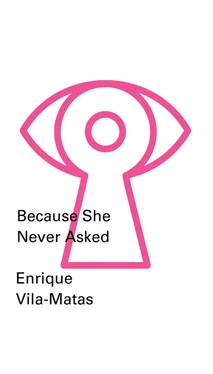Enrique Vila-Matas - Because She Never Asked
Здесь есть возможность читать онлайн «Enrique Vila-Matas - Because She Never Asked» весь текст электронной книги совершенно бесплатно (целиком полную версию без сокращений). В некоторых случаях можно слушать аудио, скачать через торрент в формате fb2 и присутствует краткое содержание. Год выпуска: 2015, Издательство: New Directions Publishing, Жанр: Современная проза, на английском языке. Описание произведения, (предисловие) а так же отзывы посетителей доступны на портале библиотеки ЛибКат.
- Название:Because She Never Asked
- Автор:
- Издательство:New Directions Publishing
- Жанр:
- Год:2015
- ISBN:нет данных
- Рейтинг книги:4 / 5. Голосов: 1
-
Избранное:Добавить в избранное
- Отзывы:
-
Ваша оценка:
- 80
- 1
- 2
- 3
- 4
- 5
Because She Never Asked: краткое содержание, описание и аннотация
Предлагаем к чтению аннотацию, описание, краткое содержание или предисловие (зависит от того, что написал сам автор книги «Because She Never Asked»). Если вы не нашли необходимую информацию о книге — напишите в комментариях, мы постараемся отыскать её.
Stranger on a Train
“Something strange happened along the way,” Vila-Matas wrote. “Normally, writers try to pass a work of fiction off as being real. But in
, the opposite occurred: in order to give meaning to the story of my life, I found that I needed to present it as fiction.”
Because She Never Asked — читать онлайн бесплатно полную книгу (весь текст) целиком
Ниже представлен текст книги, разбитый по страницам. Система сохранения места последней прочитанной страницы, позволяет с удобством читать онлайн бесплатно книгу «Because She Never Asked», без необходимости каждый раз заново искать на чём Вы остановились. Поставьте закладку, и сможете в любой момент перейти на страницу, на которой закончили чтение.
Интервал:
Закладка:
Out in the middle of the Atlantic, a long distance from everything, both Europe and America, the islands seemed, at first, the very essence of “far away.” Distance was part of their allure, perhaps. In any case, the place was ideal for being far from the madding crowd. Her first sunset there was indolent and very slow. A beautiful, bloody twilight. She scrutinized it from the balcony of her room at the Hostal Santa Cruz on Faial, looking out at mysterious Pico Island in front of her.
Pico Island is a volcanic cone that juts abruptly out of the ocean; a precipitous mountain perched atop the sea. No more than three small coastal towns nestle along the foot of the mountain: Madalena, Sao Roque, and Lajes, the latter with its small whaling museum. Contemplating the volcano’s hazy silhouette surreptitiously from Faial was all it took for her to get a sense of the island’s strange and disturbing nature. And it was even stranger in the wintertime, as now. The closer one got to the island, the more it commanded respect, as if one were being called to the very gates of things past.
Café Sport on Faial Island, also known as Peter’s Bar, was an extraordinary place: something between a tavern, a meeting hall, an information bureau, and a post office. The old whalers hung out there, as did people from ships on their way across the Atlantic or on other long-distance journeys. There was a wood-framed bulletin board with all sorts of notes stuck to it: telegrams, letters, made-up memories, drawings of boats inscribed with sentences by people who seemed shipwrecked from their own lives.
The mythical figure, José Azevedo, whom the English baptized with the nickname Peter during World War II, had died a few weeks before Rita Malú arrived at Café Sport. Now his son José Henrique Azevedo ran the bar that was founded a century earlier to serve drinks to foreigners, the Atlantic’s lonesome sailors, and the whalers. The weather along the channel between Pico and Faial Islands was stormy, so the ferries weren’t running that day. Rita wasn’t in any hurry to get to Pico and find the writer with the bushy chestnut beard. What could she possibly say to the man when she located him? She probably wouldn’t dare say anything at all.
So she spent two full days waiting for the weather to settle, conversing with the old whalers at Café Sport, taking their photos as they told passionate tales of the days when hunting cetaceans was permitted in the Azores.
In Moby-Dick , Herman Melville wrote that the bravest whalers in the world came from the Azores. With that in mind, Rita left the bar each day feeling closer to the heirs of those titans, men who told her old sea tales, which she jotted down in her notebook. Registering these stories about the ancient whalers’ lost world made her feel as though she were living happy moments in her life; perhaps this was the closest she’d ever felt — more even than at Boca do Inferno — to Sophie Calle, that person she always discreetly imitated.
At night, carefully writing out some of the yarns she had recorded during the day, she would imagine the show she’d put together at Rue de Marseille when she got back to Paris, she might even dare to invite Sophie Calle, to show her how her most devoted copycat was now able to impersonate her so truly. Rita would create a staggering wall novel with all these old whalers on Faial. The entire neighborhood would see what she was capable of.
She felt nearly perfect. After all, she was hearing more than just whale-hunting tales. She’d also been made privy to spy stories from World War II, when Faial was a strategic spot and a supply point for Allied ships and American seaplanes, the famous clippers that anchored in Horta Bay in front of Café Sport.
Two days after her arrival in Faial, Rita Malú decided to play another one of her private jokes. She hung an anonymous message on Café Sport’s bulletin board, careful that nobody saw her do it: “I’m shipwrecked from my own life, here to reject my last suitor.” Rita was sure that nobody would suspect her of leaving the note, this ordinary journalist who was just hanging around, worried (although they couldn’t possibly imagine as much), that the bad weather in the channel would abate, obliging her to board the Pico Island ferry to find the suitor she must reject; nobody was asking her to do it (really nobody had asked her to do anything), yet she sensed that somehow this rejection would allow her to say goodbye, once and for all, to the ghost of love.
“Love? I believe in it, but it’s not for me. I’ve never been and never will be in love,” Rita wrote on a small piece of paper she posted a few hours later, again, when no one was watching, in the spot where the love missives hung on Café Sport’s charming wooden bulletin board.
Good weather finally allowed the ferry across to Pico the next day. A few old whalers, now her fastidious suitors, had offered to escort her, but Rita found a way to avoid the companionship of so many impertinent men. She pulled a wedding photo out of her luggage to get them to back off, a picture she carried around if she ever needed to shoo any horseflies away. It was really another woman: Sophie Calle playing the part of a bride at her false wedding, though it was hard to tell the difference. Everyone took it to be Rita on her wedding day, since she looked so much like the artist she impersonated.
“What a bore,” she said, taking leave of the men as she boarded the ferry that was heading for Pico Island and its spectacular volcano, the tallest mountain in Portugal. Very few people were on board, she counted eight in all, each one carrying a wicker basket or woven bag; there wasn’t a single tourist among them. Rita was gripped by a sense of estrangement that intensified the closer she got to the island. Luckily, she knew what she had to do when she got there. She had read in an episode of Jean Turner’s penultimate novel that there were two cab drivers on the island: a young one and an old one. She knew not to waste a second over determining which one to hire; it had to be the older one, since the younger driver, according to Turner, was reckless. Which is exactly what she did when she landed on Pico Island. She hadn’t bothered to look up the writer’s address from Faial, in fact, she hadn’t even pronounced his name once the entire trip. All she had to do was ask the older cab driver to take her to the town of Lajes, just like one of the characters in Turner’s novel. And just like that character, she would also say she wanted to visit the Whaling Museum. And she would wait until she was in the cab before asking the whereabouts of this tall, thin young man with the bushy beard, in whose world of fictitious reality she had been circulating for some days now.
The port village of Madalena was like a ghost town. The eight people disembarked from the ferry and disappeared within a few seconds of landing, vanishing into the town’s tiny labyrinth of streets. The town was deserted at that time of year, or at least during these hours of the day. And there they were, two taxis waiting for the ferry to arrive. It seemed as if they had already been notified of Rita’s presence on board from the port in Faial. She walked straight to the older cab driver, got into his car, and asked him to take her to the Whaling Museum in Lajes. The younger driver cursed, acting as though he had expected this to happen all along; perhaps the curses were insults also meant for Turner.
The road connecting Madalena with Lajes skirted the base of the volcano, a curvy, narrow route full of deep potholes that ran along a breakwater or seawall and looked out over a deep-blue, rebellious Atlantic. The road crossed through land that had once been covered in vineyards and the sumptuous houses of patricians (all fallen to ruin); now the land was rocky and melancholic, dotted with strange, solitary, minimalist houses scattered atop low, windswept hills.
Читать дальшеИнтервал:
Закладка:
Похожие книги на «Because She Never Asked»
Представляем Вашему вниманию похожие книги на «Because She Never Asked» списком для выбора. Мы отобрали схожую по названию и смыслу литературу в надежде предоставить читателям больше вариантов отыскать новые, интересные, ещё непрочитанные произведения.
Обсуждение, отзывы о книге «Because She Never Asked» и просто собственные мнения читателей. Оставьте ваши комментарии, напишите, что Вы думаете о произведении, его смысле или главных героях. Укажите что конкретно понравилось, а что нет, и почему Вы так считаете.












